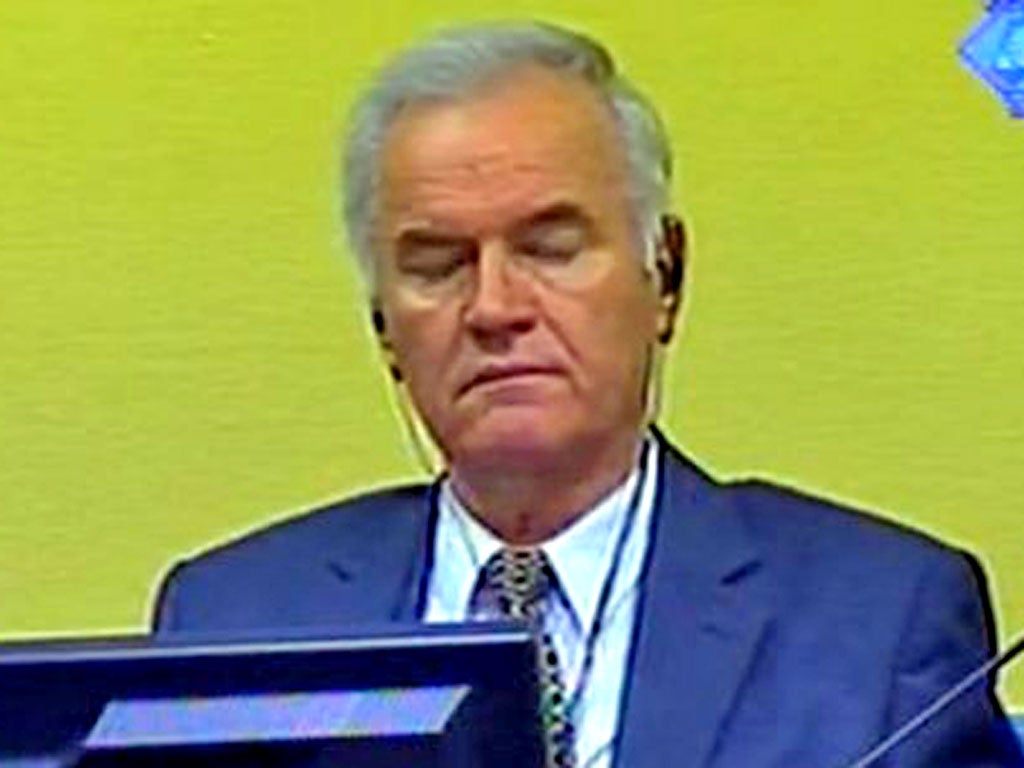After 17 years, victims who escaped the 'Butcher of Bosnia' confront him in court
Hundreds gather in Sarajevo to remember Srebrenica victims as trial of Mladic reopens in The Hague

The trial of the so-called "Butcher of Bosnia", Ratko Mladic, reopened in The Hague yesterday with harrowing testimony from the first prosecution witness, a man who as a teenager was forced to flee his village as it came under heavy fire.
Wracked with emotion, Elvedin Pasic, 34, told of his escape from Hrvacani, breaking down in tears several times. He spoke of being separated from the other men in his family, who were later massacred, and of fleeing through a field while holding the daughter of a pregnant neighbour in his arms, while under fire. "We were lucky not to get hit," he said. "The girl had bullet holes in her clothes."
Mr Mladic, who was the top general in the Bosnian Serb army, is facing 11 charges, including genocide, and faces life imprisonment if convicted.
At one point yesterday, the judge called a break as the witness was too upset to continue speaking.
Mr Pasic later described returning to his home village after the assault. "The house was burned completely, the fridge, the televisions, the walls – what was left of the walls was stripped," he said. Even his dog had been shot where it was chained up. Mr Pasic spoke in English, and did not look at Mr Mladic.
The defendant listened to a translation of the testimony through headphones, and retained an impassive expression. He appeared to nod in agreement when Mr Pasic spoke of the good relations of different ethnicities before the war. "Before the war we had a great time," said Mr Pasic, who is expected to return to the testify about the 1992 massacre in Grabovica. "We were playing basketball and football, we used to do everything together. Muslim, Croats and Serbs, we were all having a great time, respecting each other."
Mr Mladic's trial in The Hague started in May but was postponed after just one day when prosecution lawyers were forced to admit they had not provided the defence team with access to thousands of documents that would be used against Mr Mladic. His team of lawyers said it was unable to prepare Mr Mladic's defence because it did not have proper access to the materials. The defendant is accused of ordering the massacre of nearly 8,000 Muslim men and boys at Srebrenica, regarded as the worst war crime in Europe since the Second World War.
Other witnesses due to give testimony this week include Lord Dannatt, a retired British general who was the deputy commander of Nato forces in Bosnia, and an anonymous witness who survived the Srebrenica massacre, and is expected to describe how he saw captives being lined up in groups of 10 and shot.
As Mr Mladic came face to face with his accusers for the first time in The Hague, hundreds of people lined streets in the Bosnian capital Sarajevo to see off a convoy of coffins ahead of a memorial service for the thousands killed at Srebrenica in 1995. Thousands of people are expected in the village for a mass funeral ceremony of 520 victims tomorrow. Many massacre survivors travel there on that day every year to remember the events of 1995.
Ahmo Catic, 53, told the Associated Press in Sarajevo yesterday that he had been looking for his father Bekir since 1995. "May those who killed him look for their loved ones the same way I have for 17 years," he said. Body parts belonging to his father were found at five different mass grave sites, in a gruesome reminder of how corpses were mangled and hidden in different places. His father's remains were identified using DNA analysis, brought together, and will be buried tomorrow.
The prosecution and families of victims are keen to speed up the process of Mr Mladic's trial, to ensure that the former commander, who is 70, will still be alive when a verdict is reached. Although Mr Mladic is still in good health, previous trials at the court have dragged on for years.
The trial of the former Serbian President Slobodan Milosevic began in 2002, but the prosecution took two years to present its case, and when Mr Milosevic died of a heart attack in 2006, a verdict had still not been reached. The trial of another key suspect, Radovan Karadzic, the former Bosnian Serb leader who was arrested in 2008, is still dragging on, and his defence has not even started to make its case yet.
First testimony: 'Nothing to go back to'
"I remember [my neighbour] said: 'Can you please carry [my daughter] – if you have to rip her arm out, just don't let her go'," said Elvedin Pasic, 34, who faced the former Bosnian Serb military chief Ratko Mladic in court yesterday. He recounted how he and his Muslim family escaped their village, Hrvacani, in northern Bosnia, as it was shelled by troops under General Mladic's command in 1992. He was 14 at the time. "The house was burned completely," he said. Soldiers told him: "There is nothing for you to go back to: your home is Turkey, this is Serbia."
Subscribe to Independent Premium to bookmark this article
Want to bookmark your favourite articles and stories to read or reference later? Start your Independent Premium subscription today.

Join our commenting forum
Join thought-provoking conversations, follow other Independent readers and see their replies